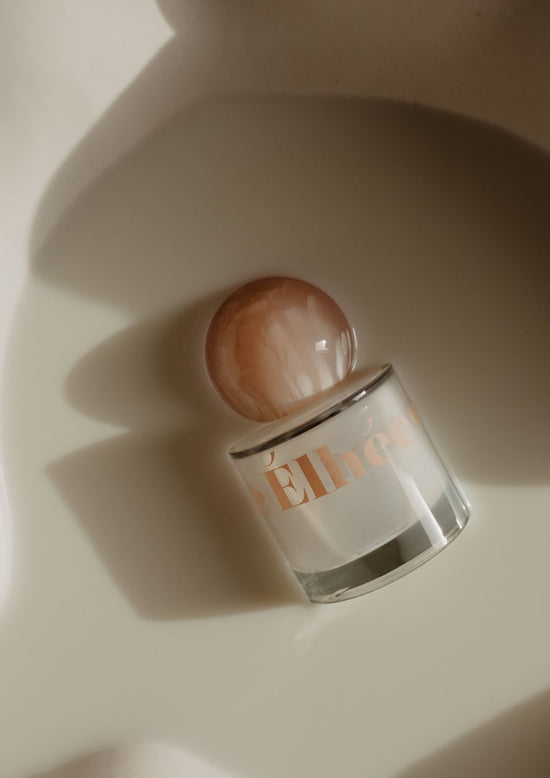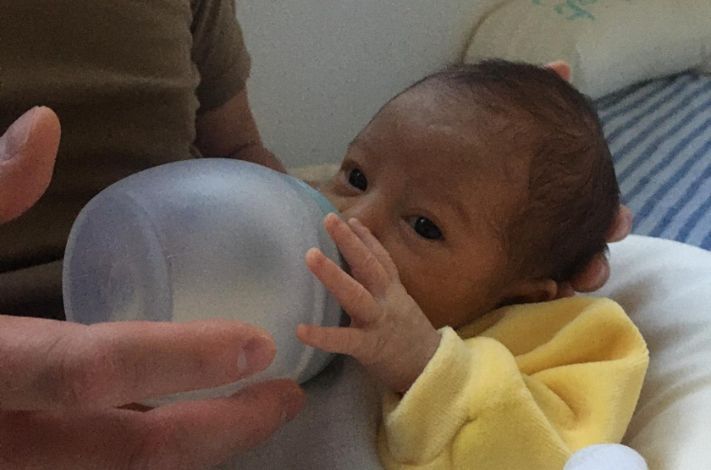L'arrivée d'un premier enfant est une expérience mémorable et émotionnellement chargée pour de nombreux parents. Cette expérience peut être encore plus intense et préoccupante si l'enfant naît prématurément.
L'inquiétude et le sentiment d’être démuni peuvent s’accroître face aux défis supplémentaires que représente la prise en charge d'un bébé prématuré, notamment en ce qui concerne son alimentation.
Nourrir un bébé prématuré s'avère souvent plus délicat, mais heureusement, des solutions adaptées existent pour accompagner les parents dans cette épreuve.
Découvrez comment nourrir un bébé prématuré avec cet article complet !
SOMMAIRE :
- Pourquoi dit-on qu’un bébé est prématuré ?
- Qu’est-ce qui provoque la naissance prématurée d’un bébé ?
- Nourrir un bébé prématuré qui a la force de téter
- Si votre bébé prématuré n’a pas la force de téter ni au sein ni au biberon
- Pour conclure
Pourquoi dit-on qu’un bébé est prématuré ?
Un bébé est considéré comme prématuré s’il naît avant le terme habituel de grossesse, prévu généralement entre le début de la 38 ème semaine d’aménorrhées et la fin de la 41 ème semaine d’aménorrhées.
Les bébés qui naissent avant la 28 ème SA sont considérés comme grands prématurés. Ils sont pris en charge dans des unités de soins néonatales spécialisés en raison de leur très grande fragilité.
Un bébé prématuré se reconnaît aussi par son faible, voire très faible, poids.
- Les nouveau-nés pesant moins de 1000 grammes sont considérés comme ayant un poids de naissance extrêmement faible.
- Ceux dont le poids se situe entre 1000 et 1499 grammes sont classés dans la catégorie de poids très faible à la naissance.
- Enfin, les bébés pesant entre 1500 et 2500 grammes sont catégorisés comme ayant un faible poids de naissance.
Cette classification en fonction du poids offre au corps médical des indications sur la santé et les besoins de chaque nourrisson prématuré.
Qu’est-ce qui provoque la naissance prématurée d’un bébé ?
Diverses raisons peuvent conduire à un accouchement prématuré :
- une grossesse gémellaire,
- un décollement prématuré du placenta,
- des problèmes de santé du foetus nécessitant le déclenchement artificiel de l’accouchement par voie basse ou une césarienne,
- un col de l’utérus affaibli,
- la rupture prématurée des membranes,
- des complications médicales chez la mère (diabète de grossesse, prééclampsie, autres…).
Nourrir un bébé prématuré qui a la force de téter
Grâce à l’allaitement maternel
L’allaitement maternel apportera tous les nutriments nécessaires à un bébé prématuré. Il est donc conseillé d’encourager votre enfant à prendre le sein si vous désirez allaiter. En raison de la minuscule taille de son estomac qui ne lui permet pas d’avaler de grandes quantités de lait et de l’effort que lui coûtera chaque tétée, il faudra penser à l’allaiter très régulièrement.
Votre lactation se mettra en place d’elle-même au fil des jours et semaines.
🍼 Article en lien : Comment relancer votre lactation ?
En exprimant votre lait à l’aide d’un tire-lait
Si l'allaitement au sein n'est pas possible à chaque repas, vous pouvez exprimer votre lait maternel et le donner à votre bébé au biberon.
Une expression régulière du lait maintient la production lactée et permet aux professionnels de santé de surveiller l'apport nutritionnel du bébé, ce qui n’est pas possible en cas d’allaitement au sein. Cela peut stresser certains parents qui n’ont pas non plus la possibilité de contrôler la quantité de lait bu par l’enfant.
Vous pouvez utiliser un tire-lait manuel ou électrique pour exprimer votre lait.
En donnant du lait en poudre spécial pour bébé prématuré
Si vous ne souhaitez ni allaitez ni tire-allaitez, sachez qu’il existe également des laits spéciaux conçus pour les prématurés, comme :
- Enfamil EnfaCare,
- Similac NeoSure,
- Gallia Bébé Expert Pré-Gallia,
- Guigoz UltimaPré (Guigoz pré-guigoz expert),
- …
Avant de choisir le lait infantile idéal, rapprochez-vous de votre pédiatre qui saura vous conseiller.
Grâce à un biberon pour bébé prématuré
Pour offrir à votre bébé le lait maternel exprimé ou le lait en poudre indiqué par votre pédiatre, vous pouvez utiliser un biberon spécial, conçu pour les bébés nés avant la fin du cycle de gestation.
Ces biberons ont des tétines adaptées à leur petite bouche et leurs capacités de succion.

Si votre bébé prématuré n’a pas la force de téter ni au sein ni au biberon
Expression du lait maternel et administration avec sonde nasogastrique ou seringue
Si votre bébé a du mal à téter, le lait maternel exprimé peut être administré à l'aide d'une sonde nasogastrique. Cette sonde est placée dans le nez et descend dans l'estomac, permettant au bébé de recevoir le lait de manière contrôlée.

Nutrition avec seringue sans aiguille
Une autre option consiste à administrer le lait maternel exprimé à l'aide d'une seringue sans aiguille. Cela peut être fait lentement pour permettre au bébé de s'habituer à la prise de nourriture.
Pour conclure
Bien que l'arrivée d'un bébé prématuré puisse susciter des inquiétudes, il est essentiel de vous rappeler qu’en tant que parents, vous n’êtes pas seuls. Grâce aux avancées médicales et aux solutions adaptées disponibles sur le marché, la nutrition d'un bébé prématuré est aujourd’hui parfaitement maîtrisée !
En résumé :
- Si votre enfant n’est pas en mesure de téter au biberon ni au sein, il sera pris en charge par une équipe de soins dans un service de néonatologie.
- S’il en a la force, vous pourrez alors l’allaiter et lui donner des laits spéciaux.
N’hésitez pas à vous équiper d’un biberon spécialement conçu pour les prématurés qui facilitera la prise de nourriture lors des repas et vous permettra d’être plus sereins si l’allaitement n’est pas une option pour vous !





